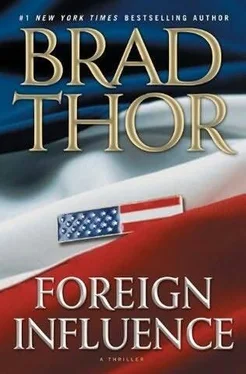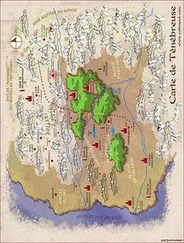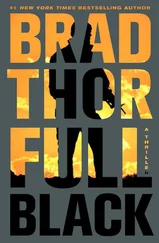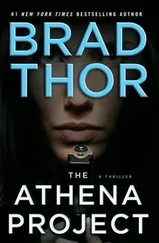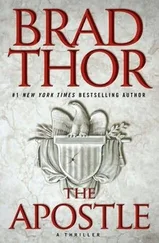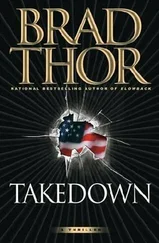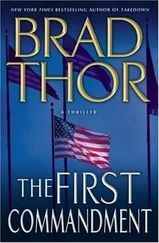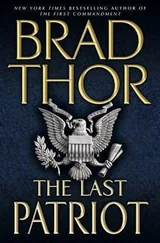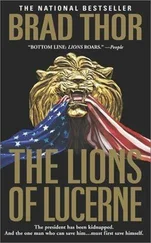His breathing was shallow and came in rapid gasps. Harvath noted his elevated temperature and pulse. The boy was shocky.
Dosing a child for a morphine injection was a tricky gamble. Getting him up the ladder and out of the pit was going to be extremely painful. Harvath removed a preloaded syringe and injected half.
“Prep an IV!” he yelled up the shaft.
Khidir was becoming unresponsive. He needed to move him now.
Cradling the child to his chest, Harvath shifted to the ladder and climbed using one arm. At the top, the medic gently took the little boy from him, laid him down, and began an IV.
“Assad’s dead, but we’ve got two survivors from the hallway,” said one of the men from the team. “What do you want to do?”
“Where’s Dent?”
“He’s processing them outside.”
“Are they stable enough for transport?” asked Harvath.
The man nodded.
“Cuff ’em and stuff ’ em with Omar.”
“You got it.”
The medic looked up from Khidir and said to Harvath, “In addition to four broken limbs and septic shock, he has a collapsed lung. I can give him some more morphine so he’ll be comfortable, but he’s not going to make it.”
That was unacceptable. The little boy didn’t deserve to die. Being the son of a policeman should be an honor, not a death sentence. “Can we get him to the hospital in Fallujah?”
“Even if we could, it will be too late.”
Harvath knew both Camp Slayer and the Green Zone were too far. “What about the Norwegian facility near the airbase at Ramadi? They’ve got a fully staffed MSF clinic there.”
The medic shook his head.
Harvath looked down as Khidir started guppy breathing.
“It’s your call,” said the medic. “What do you want to do?”
Harvath couldn’t take his eyes off the boy. “Can I hold him?”
The medic thought about it a minute. “Of course,” he said as he prepped a second syringe of morphine.
Once Harvath had the boy cradled in his lap, the medic piggybacked the drug into the IV.
“His breathing is probably going to stop soon, but I promise he won’t feel any pain.”
Harvath wanted to say Thank you, but the words didn’t come.
“These people are savages,” said the medic as he stood.
Harvath nodded. “Have Dent bring the two survivors from the hallway back in here. I want them to see this.”
The medic nodded. Moments later, Dent and one of his men brought the al-Qaeda operatives back into the room. Harvath nodded at the opposite wall and Dent shoved them down into a sitting position. He told the team member who had helped him bring the prisoners in to go wait outside. Once he was sure the entire house was empty, he came back into the room and nodded to Harvath. He had a feeling he knew what was going to happen next.
One of the al-Qaeda operatives turned his head away. Harvath yelled at him in Arabic to watch. The man reluctantly complied.
The other sat there with a smile on his face and Harvath bored holes into the man’s head with his stare.
Harvath wished the little boy could live, though he knew it wasn’t going to happen. The extra morphine had sealed the deal.
Unable to do anything else for him, he did something he hadn’t done in a long time; he prayed for a painless exit.
The little boy was fast losing his fight. His little chest rose and fell so infrequently that Harvath went for tens of seconds at a time wondering if the child had already expired.
He knew it was only a matter of time. He held the boy tighter and rocked him. The terrorist with the smile laughed at Harvath and called him a pussy.
Harvath ignored him as he tried to figure out how many seconds had passed since the little boy had last breathed.
Placing two fingers on the little boy’s neck, Harvath felt for the carotid artery. There was no pulse. Khidir had passed.
The al-Qaeda operative who had been laughing realized what had happened and now fell silent.
Harvath adjusted the boy in his arms and reached for his lifeless hand. Khidir’s fingers were rough and blistered. Into the boy’s hand he placed his Makarov and wrapped one tiny finger around the trigger.
He raised the boy’s arm. Steadying his aim, he pulled Khidir’s finger twice; firing into the laughing terrorist’s stomach.
The al-Qaeda operative screamed in pain. He began rocking back and forth, unable to reach out and clasp his wounds with his hands zip-tied behind his back.
Standing up, Harvath carried the boy outside and placed him in the truck next to Omar-Hakim.
Once everyone was loaded, the drive to Fallujah’s main police station took under half an hour.
It was almost morning, and while it would be a day of thanksgiving for five of the families, for Khidir’s it would be a day of incredible sadness.
As for Omar-Hakim and the two surviving al-Qaeda operatives, their ordeal was only beginning. They would probably never see the inside of a courtroom. Justice for them would be meted out in a different fashion. For what they had done, and what Omar-Hakim had allowed to be done to those little boys, no torture could be too painful or too horrific.
Harvath took little pleasure in what he did, but it had to be done. America was engaged in all-out war with the Islamists. And as America became more aggressive in taking the fight to them, he knew that they were going to become more aggressive in taking the fight to America.
He also knew that the loss of life wouldn’t end with Khidir. Things were going to get much, much worse before they ever got better.

VIRGINIA
MONDAY MORNING
THIRTY-EIGHT HOURS LATER
Harvath changed into shorts, grabbed two six-packs from the fridge, and walked down to his dock. He had wanted to get good and drunk in Iraq, but there hadn’t been time. He had to debrief and clean up a bunch of loose ends before flying home. Now, he had all the time he wanted.
The dock’s wooden planks were hot beneath his feet. Without the throng of weekend boaters, the Potomac was quiet. A light breeze stirred the surface of the water. It was good to be home.
In addition to tying one on, what he needed to do was put the things he’d seen and heard-things he’d known from the outset he’d probably not be able to forget-in an iron box and bury it as deep as possible in one of the farthest corners of his mind. The practice was unhealthy, but he didn’t care. It was the only way he could do his job.
Sitting down at the end of the dock, Harvath leaned against one of the pier posts, opened his first beer, and tipped it back.
His fiancée, Tracy, was up at her grandfather’s cottage in Maine, and he was grateful for the solitude. He didn’t want to see her right away. He needed to decompress and come back to reality. Or at least what he liked to call reality; that world beyond kicking in doors and shooting Islamic fanatics in the face.
The biggest reason he needed time, though, was that he knew he couldn’t talk to Tracy about what he had seen. Children had become one of those topics that they no longer discussed.
Harvath closed his eyes and lifted his face toward the sun. He had given up trying to change her mind. Because of the persistent headaches she suffered, she said she couldn’t even consider becoming a mother. At the same time, she knew that he wanted a family and she had tried to convince him to start over again with someone else. But he wouldn’t leave her, no matter how many times she worked to push him away.
She had been the victim of a vendetta launched by a sick terrorist who wanted to torture him by targeting the people around him. There were days when the pain Tracy suffered was so severe that she wished out loud that the bullet that had struck her in the head had done its intended job. It was agonizing for Harvath to hear her talk like that.
Читать дальше
